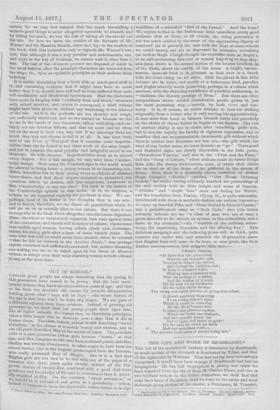OUT OF SCHOOL.* CERTAIN good people are always lamenting that
the young in this generation have ceased to be young ; that the least senti- mental women they know are about sixteen years of age; and that so far from the fatalistic old excuse for juvenile delinquencies holding good—that " boys will be boys "—the worst feature of the age is that boys won't be boys any longer. We are quite of a different opinion from these croakers. Instead of growing old prematurely, we think that our young people show signs that, Like all higher animals, the human race, on Darwinian principles, takes a little longer time to developo now-a-days than it did in former times. Novelists, indeed, persist in still describing "sweet seventeen "as the climax of womanly beauty and wisdom, just as our old poets described May as the month of roses. The,novelists refer to a past generation (when girls became " toasts " at that age, and Mrs. Langtree would have been reckoned passee, and Mrs. Shelley was writing Frankenstein in what ought to have been her School-room), just as the English poets copied from the Tuscans, who really possessed Rose di Maggio. But it is a fact that English girls are not now to be met with out of the pages of a romance who, three years under twenty, exhibit all the full- grown charms of twenty-five, combined with a good deal more prudence and knowledge of life and les convenances than is gener- ally acquired at fifty. On the contrary, "Sweet seventeen," as we behold it, is unfinished and green as a gooseberry,—unless, indeed, it happens to be in the deplorable, rotten-before-it-is-ripe
* Out of &hoot at Eton By HOMO Present Etoulans. London: Sampson Low.
condition of a miscalled "Girl of the Period." And the boys? We rejoice to find in this frolicsome little miscellany pretty good evidence that at Eton, at all events, the rising generation is not too much exalted by the sense of the approaching dignity of manhood (as is patently the case with the boys at some schools we could- name), nor yet so depressed by excessive moralising (as Arthur Hugh dough thought his comrades were at Rugby), to be still performing that sort of mental leap-frog or hop-skip- and-jump which is the nermal motion of the human intellect, as of the limbs, about the middle of the teens. A bright, haruin- Searum, open-air book it is, pleasant to look over as a brook with the trout rising on all sides. Half the pieces in this little volume are in verse, and mostly of a humorous kind, parodies and jingles scarcely worth preserving, perhaps, in a volume which assumes, with the charming confidence of youthful authorship, to "vindicate the literary prestige of Eton." But there are other compositions which exhibit considerable poetic power in just the most promising way,— namely, by both verve and har- mony. It is, of course, an entire mistake to look for striking originality from a writer who is only serving his apprenticeship. A man must first learn to balance himself easily and gracefully on the skates of rhyme before he begins to out figures. The test of nascent ability is not to strain after something quite new, but to acquire rapidly the faculty of vigorous expression, and to manifest that one incommunicable, inestimable gift without which there is neither true literature nor true art,—the gift which, for want of any better name, we must describe as "go." These good and healthful signs are clearly discernible in the little poem, "Prometheus Vinetus," and also in the "Friar and the Fairy," and the "Song of Liberty," whose authors could do better things than echo the dreary Swinburnian note,' of which their elders are as tired as of the drone of the pfifferari in the streets of Rome. Then there is a decidedly clever imitation of Arthur Hugh Clough's " Bothio," entitled, "Our House Debating Society," the writer having evidently watched the proceedings of the said society with no little insight and sense of humour. tt Ariadne" and "Angle Tarn" show real feeling for Nature, and the translation from Pindar, Olymp. IL, is quite admirable. Interleaved with these in sandwich-fashion are serious impressions de voyage up Scawfell Pike, and "From Oxford to Eton in Canoes ;" also a grandiloquent essay on "Sock Cads," who (the writer solemnly informs us) are "a class of men who are at once a great discredit to the school, an eyesore to the authorities, and a snare to the students,"—the "vendors of the enticing straw- berry, the captivating chocolate, and the alluring bun !" This delicious paragraph and the following poem will, we think, quite reassure any reader who may entertain the ill-grounded alarm that English boys will cease to be boys, or ever grow, like their Yankee contemporaries, into priggish little men :—
44 EARLY S01100L.
"If there is a vile, pernicious, Wicked, and degraded rule, Tending to debase tho vicious, And corrupt the harmless fool; If there is a hateful habit, Making man a senseless tool, With the feelings of a rabbit, And the wisdom of a mule, It's the rule which inculcates It's the habit which dictates
The wrong and sinful practice of going into school.
If there's anythhig improving To an erring sinner's state, Which is useful in removing All the ills of human fate: If there's any glorious custom Which our faults can dissipate, And can casually thrust 'cm Out of sight, and make us great : It's the plan by which we shirk
• Half our matutinal work,—
The glorious institution of always being late."






























 Previous page
Previous page